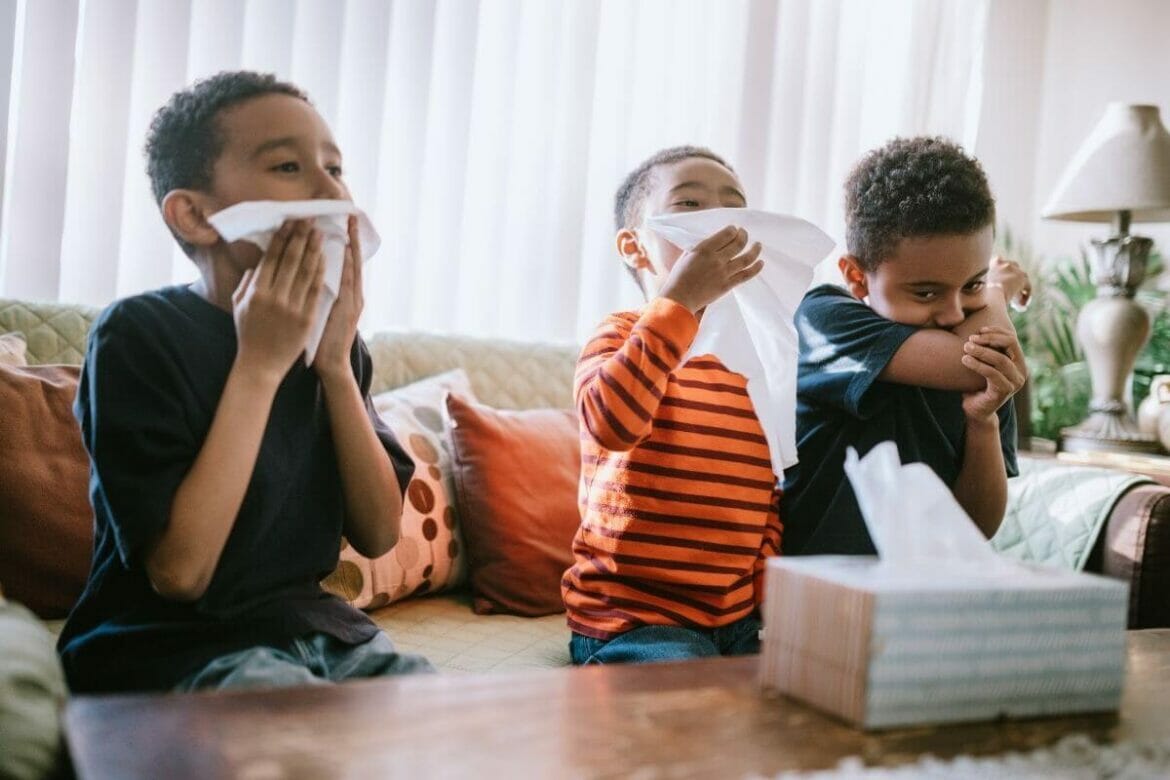Bronchitis with persistent cough is one of the commonly diagnosed respiratory disorders among children. However, it is important to know that not all kinds of cough are bad, and there are many effective home remedies to treat bronchitis induced cough in children.
Toddlers and older infants who are still crawling have a higher tendency to cough than others. This is because they are very mobile, and they want to explore and are more likely to spread it from each other.
Also, it is quite normal to cough out mucus. However, parents usually get alarmed, thinking the child is very sick. As long as the child is not wheezing and is only coughing wet mucus, they do not have any lung problems.
This article shares some home remedies that can help treat bronchitis in children.
What is Bronchitis?
Bronchitis is one of the common respiratory disorders which is caused due to bacteria or viruses. Children in their growing years often suffer from acute bronchitis that usually gets better without medicines. However, many parents do not have the right knowledge about how to treat their children naturally.
So, here are top 10 natural ways to treat bronchitis if your child is suffering from persistent cough: –
1. Cranberry juice
It is one of the best juices for fighting any viral infection as it can stop the viruses from getting adhered to the cells. Besides, it has Vitamin C, which is effective in protecting the lungs from infection.
2. Ginger
There is much evidence that ginger is packed with anti-inflammatory properties and hence helps fight against respiratory infection. The child can chew small pieces (¼ inch fresh ginger) or can consume ginger brewed into tea.
Ginger tea: Cut an inch of ginger into fine pieces and add to boiling water. Simmer for about five minutes. Then, strain the liquid and consume warm. The child can take sips whenever the cough seems to aggravate.
3. Turmeric
A commonly used spice in Southeast Asia, turmeric is very effective in inflammatory disorders. According to several studies, turmeric is extremely helpful in increasing the antioxidant property and can reduce irritation in the lungs. Besides, it is one of the best herbs for boosting immunity and has been used to treat acute bronchitis in children since ancient times. Turmeric milk is one of the common ways to give them as it will help soothe the cough.
How to use: Add ½ teaspoon turmeric powder to a glass of milk. Simmer the mixture for five minutes. Consume the milk warm. Typically taken before bedtime, but you can consume at other times as well.
4. Black pepper
It reduces inflammation of the bronchial tubes and gets rid of nasal congestion as well. In addition, it is packed with anti-inflammatory properties, which makes it best for children who suffer from respiratory disorders or chronic coughs.
How to use: ½ teaspoon black pepper powder mixed with honey provides relief. Alternatively, the child can chew 4 to 5 pepper seeds slowly and swallow the juice.
5. Giloy Juice
One of the medicinal herbs used in Ayurveda, Giloy (Guduchi), effectively soothes the lining of the throat. This juice provides relief to the inflamed lining of the bronchus and hence is beneficial for children, especially those who suffer from fever as well.
Dosage: Half a teaspoon daily is enough for children.
6. Honey
Many studies have suggested that honey is hugely beneficial in calming the cough. It is one of the natural home remedies used for cough as it is packed with antibacterial and antiviral properties. According to a study in 2007, honey has worked well for many children who have been suffering from bronchitis. Hence, honey before bedtime reduces cough and induces good sleep.
Caution: It should not be given to children below the age of 1 year.
7. Chest rubs
There are various forms of chest rubs available in different parts of the world. The commonly used compounds are camphor or eucalyptus. Several reports suggest that chest rubs have seemingly helped in coughing, and most of them have helped relax the lungs.
How to use: Apply the rub over the chest and neck and soothingly massage. The child can also inhale the rub in case of nasal congestion. Caution: Toddlers should never ingest these compounds.
8. Mustard Oil massage
Better known as Sarson ka tel in India, mustard oil is reddish-brown in colour. Commonly used in East and North India, the oil provides many health benefits, including a cure for a bronchial cough.
How to use: Rubbing it gently on the chest will help reduce stiffness from the chest. It will also ease out the congestion from the lungs and treat all the ailments related to bronchitis.
9. Steam
The age-old method will help break down the mucus and expel it out from the lungs. The easiest way to use steam remedy is to make the child bathe in warm water. Besides relieving nasal congestion, steam inhalation is a natural home remedy that helps relax the muscles of the lungs and treat bronchitis-induced cough in children.
Pro tip: Adding mentholated vapour will enhance the effects of the remedy. Older children can inhale steam from a steam inhaler.
10. Sleep
Getting enough sleep is very important for a sick child to get better soon. Sleep allows the body to rest and repair itself. In addition, sleep enhances immunity and helps the body to fight inflammation of any kind.
Pro tip: Though sleep is highly crucial to speed up recovery, the child may find it difficult to sleep with a persistent cough. In that case, look for remedies that can help reduce coughing instincts, such as lying down on raised pillows, honey or turmeric milk before bedtime, etc.
Related:
- When Cough Suppressants Don’t Work Give These Home Remedies A Try!
- Treating Insomnia Is Easy With These Amazingly Simple Natural Remedies
Bottomline
It is easier to treat bronchitis in adults than in children because the adults can express their symptoms while a child cannot. Hence, it is crucial to treat bronchitis in children carefully and adequately. The home remedies mentioned in the article are natural ways to treat the condition and calm the respiratory tract without causing any side effects. Have these ingredients handy in your kitchen; name it as the home remedy kit; start using the remedies when your child feels sick. The best part is you can use all of these remedies with short intervals of time in between two remedies. There will be no adverse interactions between the remedies, so it is completely safe to try whichever the child is comfortable with and seem to respond well.
Edited by love4wellness.com | Images: canva.com

